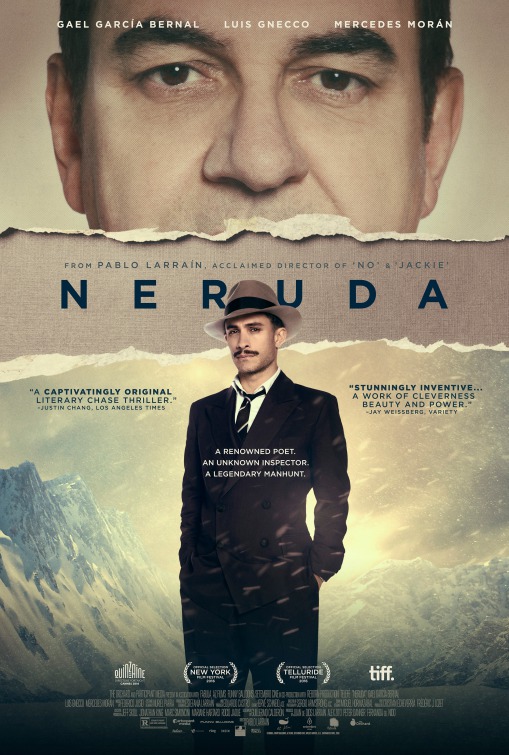Movie Breakdown: Neruda (Noah)
Pre-Screening Stance:
Everyone’s been crowing about director Pablo Larrain’s Jackie Onassis bio-pic, Jackie. I’m not usually a fan of the bio-pic format – because no one’s life in whole is really all that interesting – but Larrain is supposed to be tweaking it in smart and enjoyable ways. So, a two hour film about poet master Pablo Neruda, uh, sure!
Post-Screening Ramble:
Pablo Larrain’s Neruda starts as a well-crafted and beautiful film about the political struggles of Chile under Fascist rule, with poet-senator Pablo Neruda (Luis Gnecco) pushing back against the government forces with both his art and his voice. It’s a beautiful look at a sliver of Neruda’s life, filmed just slightly off-kilter to evoke an almost magical realist feel to the entire proceedings. But it is the film’s second half, the crux of the story, that really solidifies it as something different than your run of the mill biographical film. Neruda, under pressure from the Chilean government and a hard-talking detective looking to prove himself to his dead father (Gael Garcia Bernal), goes into hiding, bouncing from one location to another as the web of the Chilean government grows ever tighter. Garcia Bernal’s Oscar Peluchonneau becomes a hunter, tracking Neruda from town-to-town and finally into the snowy depths of Southern Chile as if he was a serial killer, instead of an artist-turned-political symbol. The hunter and the hunted slowly start to mirror each other, and Larrain, a truly brilliant director, introduces the concept that Neruda, an artist, as he continues to go to greater and greater extremes to evade capture isn’t just trying to escape, he’s writing the epic story of a poet-turned-activist. And through this, Peluchonneau becomes merely a supporting character in Neruda’s story, a conglomeration of tropes and platitudes that Neruda has used to give his own escape a sense of purpose and adventure. Larrain uses Peluchonneau as a source of noir-paranoia, a mirror for which the Neruda’s old-school masculinity – the women, oh the women – and his want to ride into the Andes on a horseback begins to look more and more set-up, the ravings and manipulations of an attention seeker on a grand scale. This is a deeply layered film, with each character representing not only some aspect of the other character, but of the idea of story and the idea of genre and how modern film has taken iconic, beloved characters and stretched them to the outer reaches of their own legends. This is a film about what it means to represent a country or an ideal and how as individuals we are both more and less than the ideas we strive to uphold. Though the film loses its footing amongst all the layers of theme for a bit near the end, Garcia Bernal’s oddball narration and sly delivery hold it together. There are not enough words to describe how impressive Luis Gnecco’s Neruda is, at once a powerful figure in the mold of classic manliness and a poetic soul, broken by its own fatal flaws. Gnecco never settles for one side of the spectrum though, instead he embodies a fully formed character, accurate or not, at all times, and it is a marvel to watch.
One Last Thought:
Why haven’t I seen Jackie yet?



